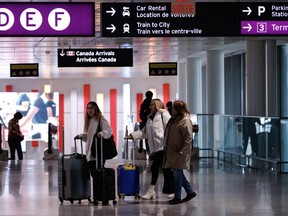
MONTREAL — Air Canada plans to bar carry-on bags and impose a seat selection fee for its lowest-fare customers in the new year, as discount carrier tactics increasingly enter the mainstream.
Starting Jan. 3, basic fare passengers on trips within North America and to sun destinations will have to check duffel bags, rolling suitcases and large backpacks for a fee — $35 for the first, $50 for the second.
A small personal item such as a purse or laptop bag will be allowed on board for free, as will strollers, mobility aids and medical devices.
The country’s largest airline also said that as of Jan. 21, lower-tier customers will have to pay if they want to change the seat assigned to them at check-in — a policy it had suspended just two days after implementation earlier this year amid backlash from travellers.
The moves mark a shift toward a budget airline-style offering from Canada’s flag carrier, which along with rivals has relied increasingly on ancillary fees for formerly bundled services that range from checked bags to on-board snacks and Wi-Fi access.
Air Canada says the changes align its fare structure with similar ticket options from other Canadian carriers and “better distinguish its fare brands.”
In June, WestJet rolled out its “UltraBasic” fare. The ticket tier allows no more than a personal item on board — stored under the seat — and charges a fee for seat selection, including after check-in, whether online or in-person. Discount carrier Flair Airlines always charges for a carry-on, which costs between $29 and $74 depending on its size.
No-frills fares carry growing appeal for big airlines seeking to capture cost-conscious travellers as budgets tighten after inflation and interest rate hikes.
“They’re competing with these low-cost carriers on various routes,” said Richard Vanderlubbe, founder of Hamilton, Ont.-based travel agency Tripcentral.ca. “This is what wins in the price-sensitive area of the market.”
Criticism of bare-bones ticket offerings is “easy,” Vanderlubbe said, but the fare tiers — up to seven at Air Canada — give travellers choice. U.S. carriers such as United Airlines, Delta Air Lines and American Airlines have similar categories, though American and Delta still allow basic economy travellers to bring a bag onto the plane at no cost.
“It’s a market solution to kind of an ugly problem,” Vanderlubbe said. “If you’re paying the lowest of the low, then who should get the middle seat at the back?”
He added that customers need to be aware that what they see as the lowest fare on a price comparison search may not wind up being the cheapest option once the fees are tallied.
“It’s not transparent until you’ve gotten a certain depth into the booking: ‘Oh, here’s the seat selection fee. Oh, here’s the baggage fee. Oh, here’s the carry-on fee.’ And watch out if you don’t check in online, there’s a massive penalty if you don’t,” Vanderlubbe said.
“It’s kind of drip, drip, drip, drip. And it works,” he said, calling the trend “troublesome.”
Transport Minister Anita Anand agreed.
Some competitors sought to seize on Air Canada’s announcement to highlight their own offerings.
That’s not always true. Some Toronto-Vancouver tickets in March start at $129 for Flair and $135 for Air Canada and WestJet. Other routes see a bigger difference, with Calgary-Toronto priced at $139 for Flair, $209 for Air Canada, $175 for WestJet and $198 for Porter.
Air Canada noted that basic fare passengers who arrive at the boarding gate with ineligible bags will be charged $65 per item to check them.
It also announced that customers on its “comfort economy” fare _ the middle of the seven tiers — can check two bags for free starting Jan. 3, rather than one.
Air Canada took in nearly US$2 billion in so-called ancillary revenue in 2022, up by nearly 50 per cent from five years earlier, according to airline consulting firm IdeaWorksCompany.
The category’s share of total revenue for the company grew to more than 15 per cent from below 11 per cent in the same five-year period.